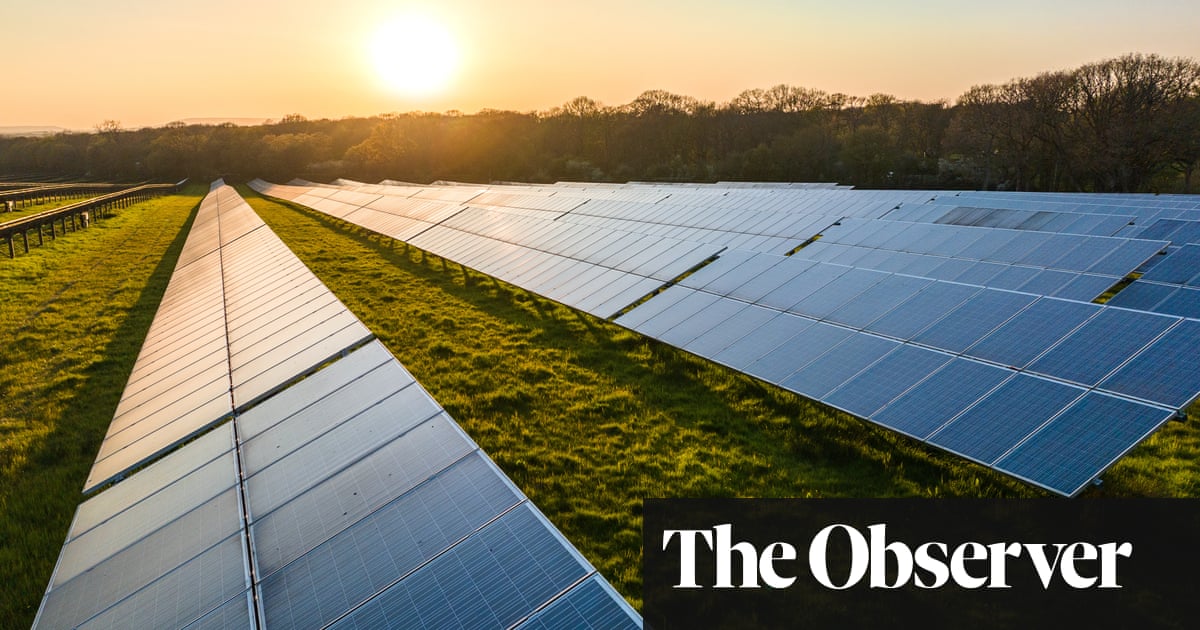
Keir Starmer’s new Labour government today unveiled plans for a “rooftop revolution” that will see millions more homes fitted with solar panels to cut domestic energy bills and tackle the climate crisis.
Energy Secretary Ed Miliband also took the hugely controversial decision this weekend to approve three huge solar farms in eastern England that had been blocked by Conservative ministers.
The three sites alone – Gate Burton in Lincolnshire, Sunnica Energy Farm on the Suffolk-Cambridgeshire border and Mallard Pass on the Lincolnshire-Rutland border – will provide around two-thirds of the rooftop and ground-mounted solar installed in the last year.
Now, ahead of Wednesday’s King’s Speech, which will include legislation to create the new state-owned energy company GB Energy, Miliband is working with the construction industry to make it easier to buy new homes with panels installed, or to have them installed on existing homes.
THE Observer Ministers are considering introducing solar energy standards for new builds from next year. Another possible idea would be to require developers to fit a certain number of new homes with solar panels as part of any new construction project.
Currently, although planning permission is not required, there are restrictions on the location and height of buildings where these projects can be located. There are also restrictions in conservation areas and on listed buildings. These restrictions may also be reviewed.
Miliband, who has pledged to triple the amount of solar power in the UK by 2030, as well as doubling onshore wind and quadrupling offshore wind, said on Saturday night: “I want to spark a solar rooftop revolution in the UK. We will encourage builders and homeowners in every way possible to bring this win-win technology to millions of addresses across the UK so people can generate their own electricity, reduce their bills and at the same time help tackle climate change.”
Its officials insisted that the new government was showing its willingness to “take on the NIMBYs” as part of the fight against the climate crisis.
One of his first acts last week was to lift the Conservatives’ de facto ban on new onshore wind farms.
Miliband’s swift action on solar power has been welcomed by British energy experts, who said it would quickly correct a huge imbalance in Britain’s use of renewable energy.
Currently, most of the electricity generated from renewable sources is concentrated in the north of the country, but must be transported to the south, where demand is highest. “Unfortunately, these transmission lines are congested and the supply of electricity from north to south is often limited,” said Sugandha Srivastav, from the Smith School of Enterprise and Environment at the University of Oxford.
after newsletter promotion
“Instead, gas generators have to be fired up to provide electricity to households in the south, and as we all know, since the Russian invasion of Ukraine, gas can be extremely expensive. So solar power in the south will solve a key problem. It will help keep electricity costs down, which is something we desperately need.”
The opening of the Gate Burton, Sunnica and Mallard Pass solar farms will also increase the country’s capacity to use solar radiation to generate electricity. “The three farms will have a capacity of about 1.35 gigawatts, which is almost 10% of current capacity. So that’s very good news,” said Hamish Beath, an energy consultant at Imperial College London.
However, the decisions have sparked protests locally. Conservative MP for Rutland and Stamford Alicia Kearns said she was “deeply dismayed” by Miliband’s decision to give the Mallard Pass farm the green light.
The government hit back by saying the move was justified on the grounds that it would provide clean energy to power around 92,000 homes over the next 60 years.
Opening the door to more large-scale solar farms will need to be quickly followed by improvements to the national electricity grid, experts also say. “We need to think urgently about how we transmit and distribute electricity,” Srivastav added. “The demand for electricity will only increase as we electrify society and if we fail to get the electricity to where it needs to be, we will find ourselves in an untenable situation.”

